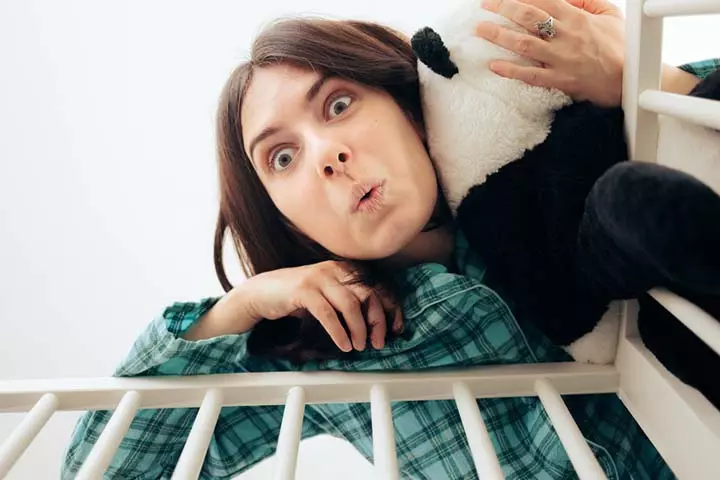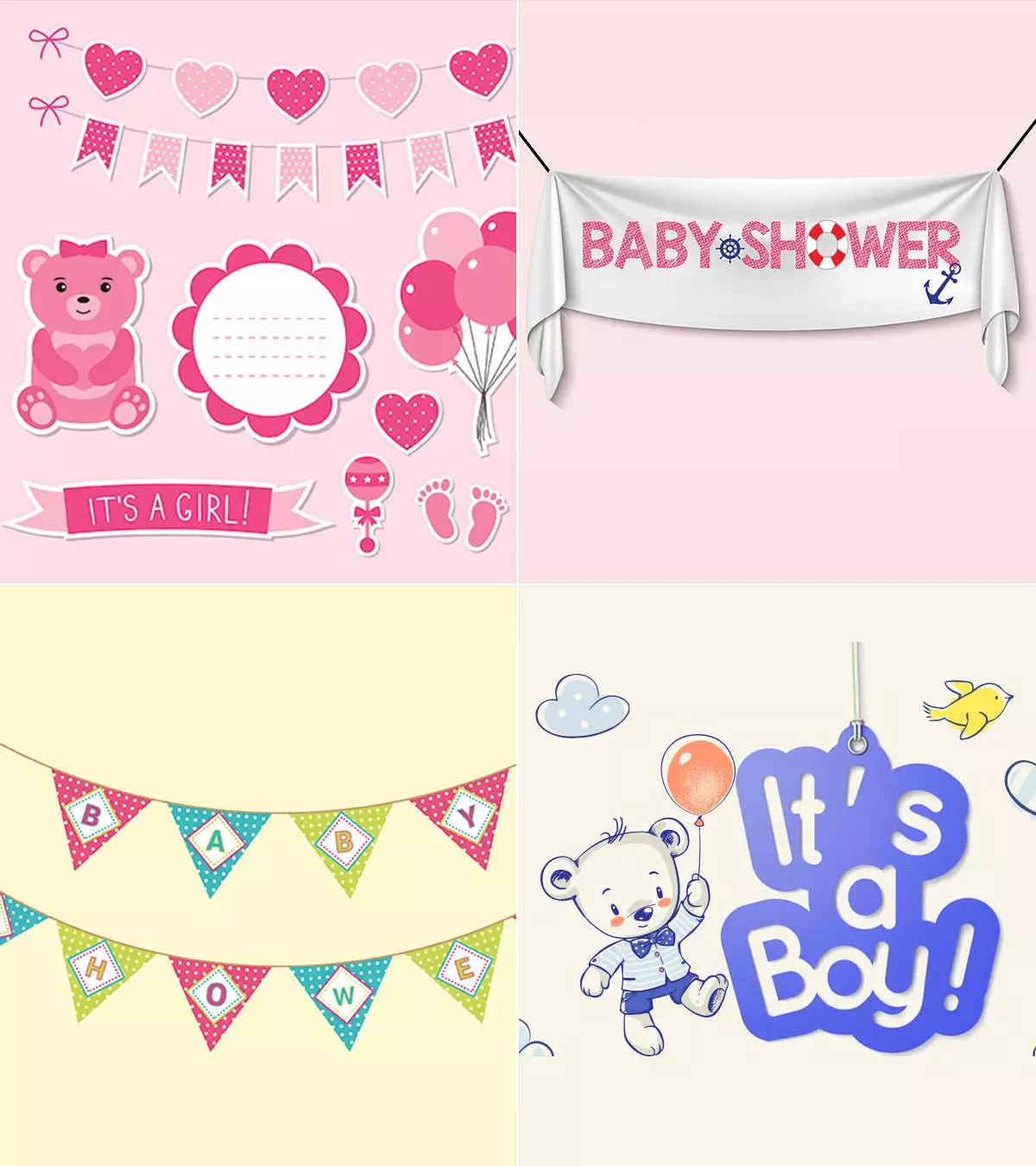
Image: Shutterstock
You may notice your baby cries frequently when they are hungry, in pain, or need care. You should know that this is how they communicate until they develop speaking abilities. However, the sounds of the cries are often identical, leaving new parents perplexed as to why the baby is wailing. Priscilla Dunstan collaborated with some research institutions to decipher different cries of a baby using a discrete wavelet transform method to assist new parents in understanding their baby’s sounds. She created the Dunstan infant language (1), which led to the discovery of five baby sounds, each with a different meaning. Read this post to learn about the different types of cries, the reasons, and how to deal with infant crying episodes.

Key Pointers
- Crying is a form of communication for babies.
- The hungry, uncomfortable, or sleepy cries have distinct patterns and frequencies.
- Having colic or feeling bored are other reasons babies might cry.
- Never get angry or shake your baby vigorously when they are crying.
- Asking for help, taking a break, and a few more tips on dealing with baby’s crying spells as you read through.
Different Types Of Baby’s Cries
Parents need to understand why a baby is crying to help soothe them, build trust, and support their emotional development. Rubi Zendejas Marquez, a mother and a trained Montessorian, shares her journey of learning and deciphering the different types of her baby’s cries. She emphasizes, “F (Rubi’s baby) was very determined to communicate from day one and didn’t stop until her needs were met. When she was born she let us know (as every newborn does) with different types of cries that she was uncomfortable, overwhelmed, tired, bored, frustrated, lonely, and hungry. It took me a long time to identify all the different types of cries, but now I am able to identify when she is in pain, hungry, frustrated, tired, etc. through the different sounds that she emits (i).”
Although all babies’ cries seem similar, each cry is distinct and pointing at a specific need of the baby. Here are eight different cries of a baby, their nature, and the reasons behind them.
Let’s begin with the five different baby sounds, according to the Dunstan Baby Language.
1. ‘Neh’- I am hungry.
When your baby’s cry starts with the sound ‘neh,’ then it could mean that the baby is hungry (2). You could also notice additional baby hunger cues, such as sucking hands, touching the mouth’s palate with the tongue, and pushing hands inside the mouth (3).
What to do: You can soothe these cries by feeding the baby.
 Quick fact
Quick fact2. ‘Heh’- I am tired or uncomfortable.
If your baby starts to cry with a ‘heh’ sound, then it could be that the baby is either uncomfortable or tired (2). If your baby is tired, then along with crying, they would also rub their eyes and nose.
What to do: Check the baby’s diaper, or look if the baby is feeling itchy or cold. Check the room temperature, dim the lights, tuck in the baby, and try rocking them to sleep.
3. ‘Eh’- I need burping.

If your baby begins crying with an ‘eh’ sound, it may indicate that they are either tired or need to be burped (2). Babies need to be burped after feeding to get rid of the excess air they might have swallowed while drinking milk (4). If the baby is not burped, then they might get cranky, spit-up, and give out a cry that starts with an ‘eh’ sound.
What to do: Lift the baby and help them burp.
 Quick tip
Quick tip4. ‘Eairh’- I have lower abdomen gas.
‘Eairh’ is a sound your baby might make when discomfort is due to gas in the lower abdomen, cramps, or flatulence (5). It may also indicate indigestion. Other signs of abdominal distress could include pulling knees up and pushing out with their legs.
What to do: The best way to soothe this type of cry is by:
- Applying gentle pressure and massaging your child’s belly
- Identifying which foods have caused the gas and avoiding them
- Helping the baby burp
Once the gas is released, the discomfort goes away, and your baby will stop crying (6).
5. ‘Owh’- I am sleepy.
When your baby gives out loud cries with an ‘owh’ noise, then it could mean that the baby is sleepy (5).
This cry will be longer and will be accompanied by yawning. Also, the baby would be rubbing their eyes with their hands.
What to do: Put the baby in their comfortable spot, and gently rock them to sleep.
These are some of the possible baby cries, and the reasons behind them as per the Dunstan Baby Language method. You can learn more about Priscilla Dunstan’s methodology and see its application in the following video.
Other Reasons For A Baby To Cry
- I am bored: If babies are left to play on their own for a long time, or when they are bored, they give out a cry that starts as coos and ultimately leads to loud crying (7).
What to do: Take your baby into the arms and play with them for a while, and you will find that the crying has stopped.
- I have got colic: When your baby gives out intense wails and is restless, it could be because of colic. These cries would be inexplicable and in high pitch. Along with crying, babies also clench their fists, curl their legs, and arch their backs. It occurs up to three hours a day, at least three days a week, and at least three weeks a month (8). According to the American Academy of Pediatrics, approximately one in five infants are affected by colic (6).

What to do: Colic usually peaks at six weeks and lasts until three to four months. Doctors are unsure about what causes colic. One possible theory is that it can be due to an imbalance of healthy bacteria in the gut or due to overstimulation of the baby’s mind. Gas doesn’t cause colic. But colicky babies often get gassy due to inhaling excess air through their mouths while crying. Avoiding foods that cause abdominal gas can help prevent colic (9).
- I have had enough: A fussy, whiny cry with the head turning away is a sign that some external stimuli are stressing your baby.
What to do: Identify and remove the stimulus. Take your baby in your arms and try making soothing sounds to calm them (7).
These are the most common reasons for babies to cry. You would be able to soothe your baby if you can identify the cry and its reason.
 Quick fact
Quick factWhat To Do When You Cannot Find A Reason Behind The Crying?

Sometimes you will be unable to find the reason behind your baby’s cry. Many babies would cry for 15 minutes to an hour daily, without any discernible reason. A good cry could be the baby’s way to release stress or unwind (10).
If there are no worrying signs, such as fever, vomiting, trouble in breathing, loss of appetite, and change in their sleep schedule, then do not worry if you cannot find the reason behind your baby’s cry.
To stop the baby from crying, you can try feeding, making them comfortable, or play with them. However, if they do not stop crying after an hour or are showing any worrisome signs, then it is best to take them to a pediatrician (7).
The Art Of Reading Your Baby’s Cries
Understanding the baby’s cries could be overwhelming to a new parent. Even though the mother would have a bond with the baby, reading the baby’s cries could be quite a task sometimes. Do not stress out if you have not mastered this art yet. Take your time to understand why your baby is crying at a certain period, and eventually, you will be able to understand your baby’s language.
Also, adopting a daily routine of feeding, sleeping, and diaper changes can help you fulfill your baby’s basic needs, which could be the reason for crying most of the time. Next, we will find out what one should not do when your baby is crying.
What Should You Not Do When Your Baby Is Crying?
No matter how bad your baby’s cries might be, there are certain things you should never do.
- Do not panic: This is true in the case of new mothers. It could be painful seeing your precious baby cry, but do not panic. Instead, try to compose your thoughts and focus on finding the reason behind the cries.

- Never punish: No matter how annoying it gets, never punish your baby for crying. A baby cries because it is the only way they can communicate their needs (7).
- Do not ignore: Never ignore your infant’s crying as it is a way to communicate their needs. Always make sure you check their last feeding time, diaper, etc., to find out the reason for crying. Studies suggest that ignoring your child while crying can lead to an insecure attachment that might negatively affect the baby’s social and cognitive development (11).
- Do not get angry: Do not lose your cool and get angry. Try to stay positive and take control of the situation. If you are a new mom, then it might take some time to understand the reason behind your baby’s cries (7).
- Do not shake your baby: Shaking a baby severely to make them stop crying could lead to severe brain injury, which might result in shaken baby syndrome, also known as abusive head trauma. This could lead to fatal long-term health problems. Therefore, never shake your baby to make them stop crying (12).
Once you understand why your baby is crying, it becomes easy to soothe them. Even babies learn to adapt to the routine and outgrow colic and crying. Remember, as much as it is stressful for the baby to cry, it is equally overwhelming for the parents. Read on to find out how you can survive the crying spells.
How To Face The Crying Spells?
Frequent baby crying could lead to late-night feeds and sleepless nights for the parents. However, it is important to take care of yourself while nurturing the baby. Here are a few tips that could help in comforting a crying baby (7).
- Take a break: If you are exhausted, then take a break. Ask your partner, friend, or a trusted family member to take care of the baby for a while. Take out this time to relax, both physically and mentally. If possible, take some time off to try some de-stressing exercises or go to a spa.
- Ask for help: Handing a newborn baby could be demanding, so never hesitate to ask for help. Do not take the load all by yourself. Keep your partner equally involved in raising the baby. You can also take help and advice from your peers or contemporaries who had babies of their own.

- Do not stress: If you are all alone by yourself with no one to help and the crying is really getting on your nerves, then set the baby in a safe place like the crib or the bassinet, step out of the room, and take a time out. Take deep breaths and try to calm yourself. Once you are back to normal, try focusing on soothing the baby.
 Did you know?
Did you know?- This too shall pass: The baby’s crying will not last forever. Most babies fall into a routine of feeding and sleeping, and if it is colic, it will resolve by three months. The crying phase can be tough. Remember to eat healthily, and exercise regularly, because only when you are healthy, you can take good care of your baby.
Frequently Asked Questions
1. What age does the baby cry the most?
Babies usually cry the most during the first three months of life (13). Nevertheless, each baby is different, and the phase may vary among infants.
2. Is it normal for babies to cry for no reason?
Babies below three months may seem to cry for no apparent reason. This is normal as long as the baby is feeding, sleeping, and growing adequately (14)
3. Will my baby’s crying change as they grow?
Yes, the pattern of crying in babies may change as they grow. Their food and sleep requirements change as they reach new developmental stages, affecting their crying. Separation anxiety, teething, or general illness may also contribute (7).
4. Is it okay to let a baby cry if nothing is wrong?
There is no danger in a baby’s excessive crying, provided there are no medical problems. Many infants need to cry for a while before they can sleep (15).
Like sleeping and eating are essential for a baby to grow, crying is also a significant part of their development. However, it can be challenging to handle if your baby constantly cries for long periods in the initial days. But do not get demotivated. If you think your baby cries too much and if you are unable to figure out the cause behind the newborn’s fussiness, give yourself and your baby some time to understand each other. As babies grow older, their crying pattern becomes more predictable and also manageable for you to take care of.
Infographic: Signs Associated With Crying That Needs Medical Attention
Although babies’ cries are the primary means of their communication, especially during the first year, certain signs associated with continued crying necessitate medical attention. Here is an infographic that details the indications of when you must see a doctor for your baby’s crying.
Some thing wrong with infographic shortcode. please verify shortcode syntax
Illustration: Different Types Of Baby Cries And Their Reasons

Image: Stable Diffusion/MomJunction Design Team
Deciphering a baby’s cries can be challenging for new parents. Watch this video to learn about PURPLE crying, what each cue means, and how you should handle your baby.
Personal Experience: Source
MomJunction articles include first-hand experiences to provide you with better insights through real-life narratives. Here are the sources of personal accounts referenced in this article.
i. Communicating with your baby.https://montessorimoms.wordpress.com/2013/11/01/communicating-with-your-baby/
References
1. Anyawee Chaiwachiragompol, Nattawoot Suwannata; (2016); The Features Extraction of Infants Cries by Using Discrete Wavelet Transform Techniques.
2. Debra M. Zeifman, and Ian St James-Roberts;Automated Speech Recognition System to Detect Babies’ Feelings Through Feature Analysis.
3. Signs Your Child Is Hungry or Full; Centers for Disease Control and Prevention.
4. Baby Burping, Hiccups & Spit-Up; Baby Burping, Hiccups & Spit-Up; American Academy of Pediatrics.
5. Franti, Eduard, et al; (2018); Testing the Universal Baby Language Hypothesis – Automatic Infant Speech Recognition with CNNs
6. Abdominal Pain in Infants: 8 Possible Reasons Your Baby’s Tummy Hurts; American Academy of Pediatrics.
7. Crying baby; Pregnancy Birth & Baby
8. Understanding Your Baby’s Persistent Crying: 7 Common Causes and Solutions; C.W. Williams Community Health Center
9. Colic in Babies; American Pregnancy Association
10. Infants: How Do Babies Communicate?; The Warren Center
11. Debra M. Zeifman, and Ian St James-Roberts;Parenting the Crying Infant; NCBI
12. Taşar, Medine A., et al; (2014); Long-term Outcomes of the Shaken Baby Syndrome Prevention Program: Turkey’S Experience.
13. What to Do When Babies Cry; Nemours Children’s Health
14. Crying Baby – Before 3 Months Old; Seattle Children’s Hospital
15. What science says about letting your baby ‘cry it out’; University of Michigan
16. Soothing a crying baby; NHS
Community Experiences
Join the conversation and become a part of our nurturing community! Share your stories, experiences, and insights to connect with fellow parents.
Read full bio of Pranjul Tandon
Read full bio of sanjana lagudu
Read full bio of Rebecca Malachi
Read full bio of Ghazia Shah

















